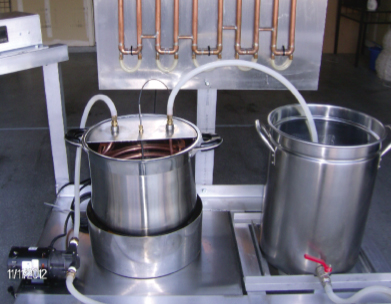Topic: All Grain Brewing
No-Sparge Brewing
I am definitely a subscriber to the idea that keeping things simple is a benefit to many things that brewers do in the pursuit of great beer. Simplifying things can have a
Mash Hopping
The direct answer to this question is no. Hops do not need to be figured into the water-to-malt calculus. This ratio is used to determine strike water temperature and has a real
Hot Liquor Tank Temperatures
Paul, the direct answer to your question is “no”; using 200 °F (93 °F) water to heat wort with a copper coil heat exchanger is not going to hurt your efficiency. The important
Decoction Mashing
I really like this approach! This is the first time I have heard of your method and cannot think of any huge problems. It is certainly similar to decoction mashing, except that
Step Mashing Techniques
Learn the steps of step mashing, and when (or if) they are necessary.
Mash Starches
Mr. Wizard analyzes what happens to starches in the mash tun & more.
Overnight Acidification
When you want to brew a sour beer but don’t want to wait months to drink it, try kettle souring.
Mixing Valve: Projects
Achieve a precise water temperature for mashing in or lautering by building a mixing valve.
Build A Heated Mash Tun: Projects
Keep your mash temperatures constant by building your own internally heated mash tun.
Hitting final gravities
This is a difficult question to address because there are some important facts that are missing, such as wort original gravity (OG), grist bill, mashing method, yeast strain and fermentation temperature. But
Starch Conversion
If you achieve less than 100% of a brewer’s possible yield, are there not unconverted starches present in the beer that will cause a haze? Or are all the remaining starches insoluble?
Denatured Enzymes
Hey Joe . . . I heard you cooked your old alpha amylase down . . . how are you going to mash now? I guess if you believe the threads about




